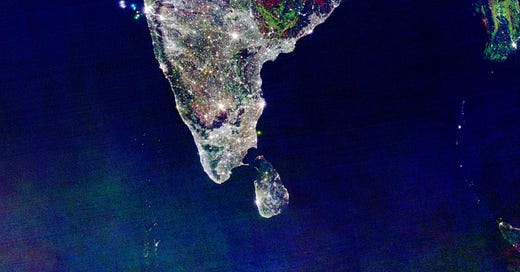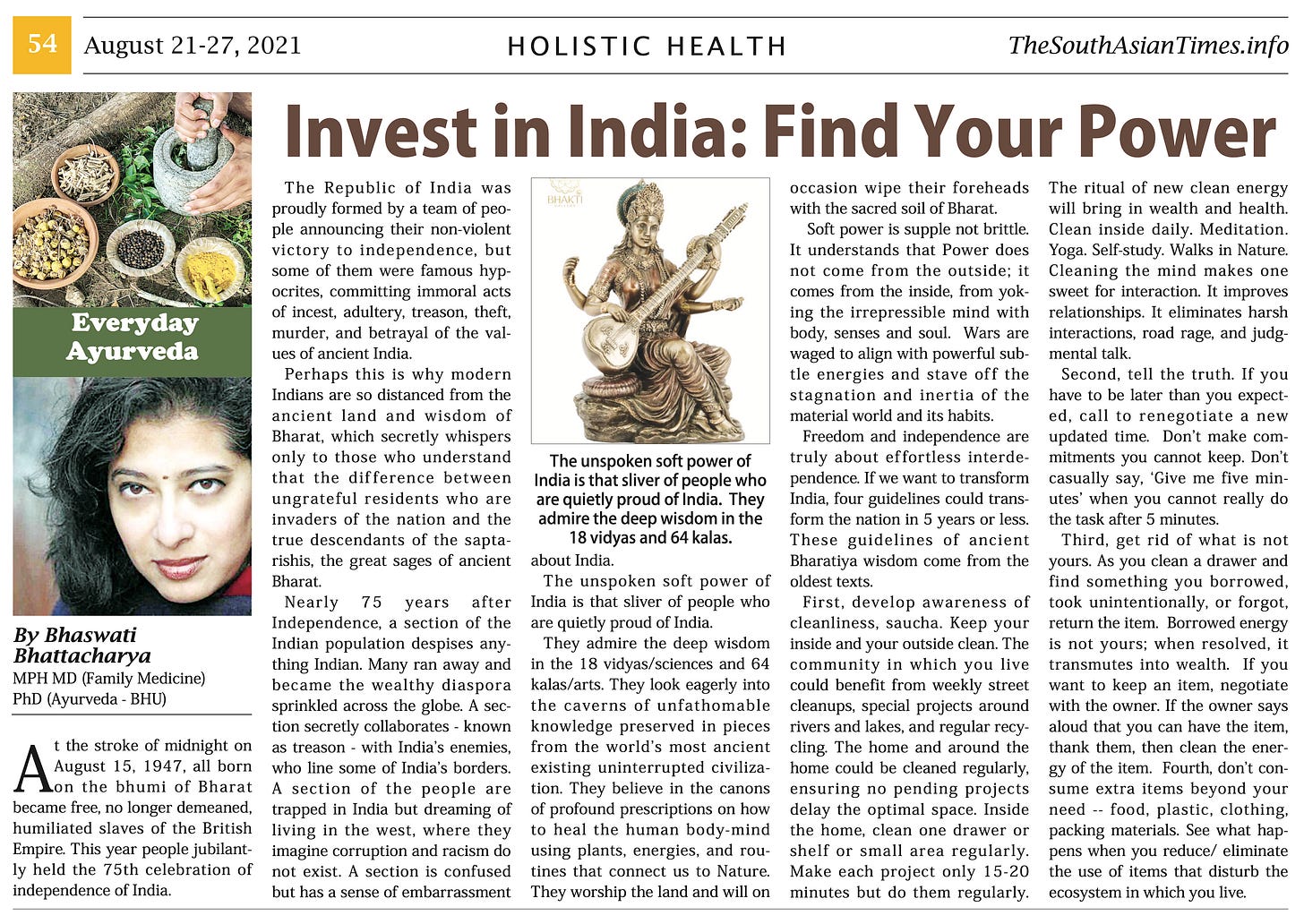Find Your Power: Invest in the soft power of India
Nearly 75 years after Independence, a section of the Indian population despises anything Indian as a remnant of the British ravage. The unspoken soft power of India is that sliver of people who are quietly proud of India and its ancient wisdom, continuously practiced for the past 10,000 years.
Source: NASA
At the stroke of midnight on August 15, 1947, all born on the bhumi (soil) of Bharat became free, no longer demeaned, humiliated slaves of the British Empire. This year people jubilantly held the 75th celebration of independence of India.
The republic of India was proudly formed by a team of people announcing their non-violent victory to independence, but many of them were famous hypocrites, committing immoral acts of incest, adultery, treason, theft, murder, and betrayal of the values of ancient India.
Perhaps this is why modern Indians are so distanced from the ancient land and wisdom of Bharat, which secretly whispers only to those who understand that the difference between ungrateful residents who are invaders of the nation and the true descendants of the sapta-rishis, the great sages of ancient Bharat.
Nearly 75 years after Independence, a section of the Indian population despises anything Indian. Many ran away and became the wealthy diaspora sprinkled across the globe. A section secretly collaborates - known as treason - with India’s enemies, who line some of India’s borders. A section of the people is trapped in India but dreaming of living in the west, where they imagine corruption and racism do not exist. A section is confused but has a sense of embarrassment about India.
The unspoken soft power of India is that sliver of people who are quietly proud of India.
They admire the deep wisdom in the 18 vidyas/sciences and 64 kalaas/arts. They look eagerly into the caverns of unfathomable knowledge preserved in pieces from the world’s most ancient existing uninterrupted civilization. They believe in the canons of profound prescriptions on how to heal the human body-mind using plants, energies, and routines that connect us to Nature. They worship the land and will on occasion wipe their foreheads with the sacred soil of Bharat.
Soft power is supple not brittle. It understands that Power does not come from the outside; it comes from the inside, from yoking the irrepressible mind with body, senses and soul. Wars are waged to align with powerful subtle energies and stave off the stagnation and inertia of the material world and its habits.
Freedom and independence are truly about effortless interdependence. If we want to transform India, four guidelines could transform the nation in 5 years or less. These guidelines of ancient Bharatiya wisdom come from the oldest texts.
First, develop awareness of cleanliness, saucha. Keep your inside and your outside clean. The community in which you live could benefit from weekly street cleanups, special projects around rivers and lakes, and regular recycling. The home and around the home could be cleaned regularly, ensuring no pending projects delay the optimal space. Inside the home, clean one drawer or shelf or small area regularly. Make each project only 15-20 minutes but do them regularly. The ritual of new clean energy will bring in wealth and health. Clean inside daily. Meditation. Yoga. Self-study. Walks in Nature. Cleaning the mind makes one sweet for interaction. It improves relationships. It eliminates harsh interactions, road rage, and judgmental talk.
Second, tell the truth. If you have to be later than you expected, call to renegotiate a new updated time. Don’t make commitments you cannot keep. Don’t casually say, Give me five minutes when you cannot really do the task after 5 minutes.
Third, get rid of what is not yours. As you clean a drawer and find something you borrowed, took unintentionally, or forgot, return the item. Borrowed energy is not yours; when resolved, it transmutes into wealth. If you want to keep an item, negotiate with the owner. If the owner says aloud that you can have the item, thank them, then clean the energy of the item.
Fourth, don’t consume extra items beyond your need -- food, plastic, clothing, packing materials. See what happens when you reduce/ eliminate the use of items that disturb the ecosystem in which you live.
Everyday Ayurveda by Bhaswati Bhattacharya
week 73. TheSouthAsianTimes
Download the .pdf version of this column by clicking on the image.
Dr. Bhaswati Bhattacharya is a Fulbright Specialist 2018‐2023 in Public Health. She serves as Clinical Asst Professor of Family Medicine in the Department of Medicine at Weill Cornell Medical College in New York, NY.
Her bestselling book Everyday Ayurveda is published by Penguin Random House. To order an autographed copy, write to bhaswati@post.harvard.edu.






